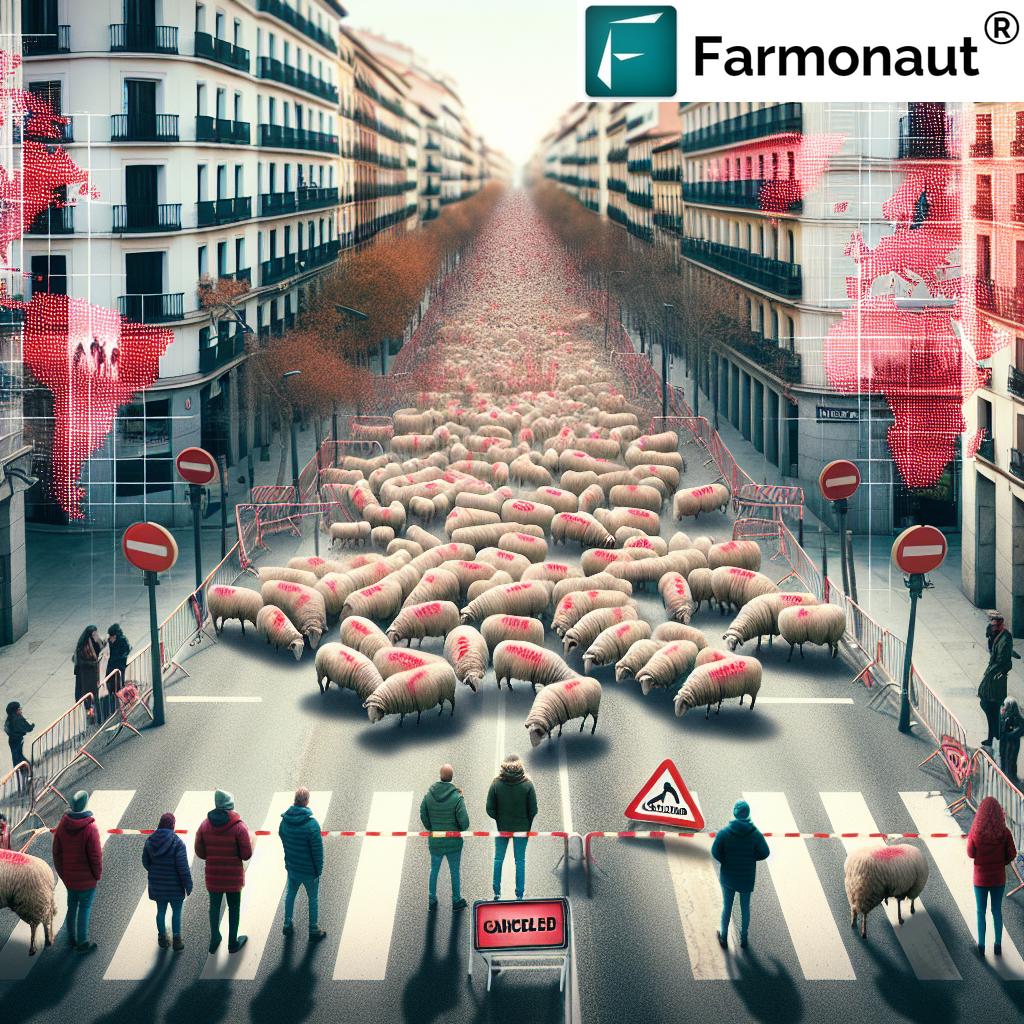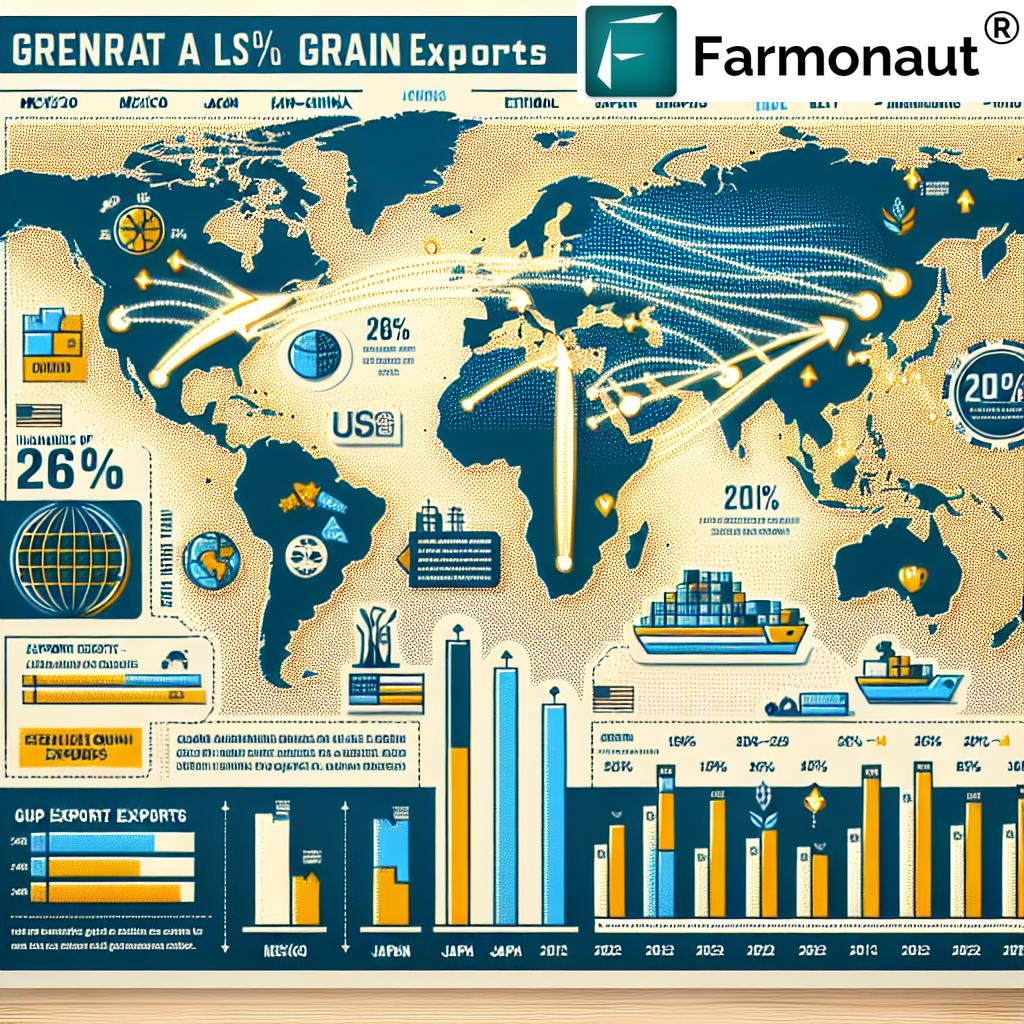Urgent: Madrid’s Beloved Sheep Parade Halted as Bluetongue Threat Looms Over Spanish Agriculture
Madrid, Spain – In a heartbreaking turn of events for both locals and tourists alike, the iconic Fiesta de la Trashumancia, Madrid’s annual sheep herding spectacle, has been canceled due to the looming threat of a new bluetongue disease variant. This decision marks a significant moment in the delicate balance between preserving cultural heritage and safeguarding the health of Spain’s vital agricultural sector.

The Threat of Bluetongue Disease in Spain
Bluetongue disease, a serious viral infection affecting ruminants such as sheep, cattle, and goats, has been a persistent concern for European livestock farmers. The emergence of a new variant, known as BTV3, has raised alarms across the continent, prompting swift action from agricultural authorities.
While Madrid itself hasn’t reported any cases of the bluetongue disease, the decision to cancel the beloved Madrid sheep herding event is a precautionary measure aimed at preventing the potential spread of the virus. This move underscores the gravity of the situation and the commitment of Spanish authorities to protect their agricultural heritage.
Impact on the Fiesta de la Trashumancia
The Fiesta de la Trashumancia, a vibrant celebration of Spain’s shepherding traditions, typically sees thousands of sheep parading through the heart of Madrid. This colorful event, which has been a staple of the city’s cultural calendar for centuries, serves as a vivid reminder of the deep connections between urban life and rural traditions in Spain.
The cancellation of this year’s festival is more than just a disappointment for spectators; it represents a significant disruption to a long-standing cultural practice. For many shepherds, the annual trek to Madrid is not merely a symbolic gesture but an integral part of their livestock management strategy.
Livestock Movement Restrictions in Madrid
In response to the bluetongue threat, authorities have implemented strict livestock movement restrictions across Madrid and surrounding regions. These measures are designed to minimize the risk of disease transmission and protect the health of Spain’s valuable livestock population.
The restrictions include:
- Prohibition of non-essential livestock transport
- Mandatory health checks for animals crossing regional boundaries
- Increased surveillance and reporting requirements for farmers and veterinarians
- Temporary closure of livestock markets and auctions
While these livestock movement restrictions in Madrid may cause short-term inconvenience, they are crucial for the long-term health and sustainability of Spanish agriculture.
BTV3 Variant: A New Challenge for Animal Health
The BTV3 variant of bluetongue disease presents unique challenges for animal health professionals and farmers alike. This new strain has shown increased virulence and the ability to spread more rapidly than previous variants, making effective control measures all the more critical.
Key characteristics of the BTV3 variant include:
- Higher transmission rates among ruminants
- Potential for more severe symptoms in infected animals
- Increased resilience to existing vaccination protocols
- Ability to affect a wider range of ruminant species
These factors have necessitated a rapid response from agricultural authorities across Europe, with a focus on BTV3 variant prevention and containment strategies.
Sheep Disease Prevention Measures
Sheep disease prevention has become a top priority for Spanish agricultural officials. In addition to movement restrictions, a comprehensive approach to disease control is being implemented, including:
- Accelerated vaccination programs for susceptible livestock
- Enhanced biosecurity measures on farms and during transport
- Increased monitoring of vector populations (primarily Culicoides midges)
- Public awareness campaigns to educate farmers and rural communities
These measures are part of a broader strategy to protect Spanish agriculture from the potentially devastating effects of bluetongue disease.

Impact on Spanish Agriculture and Economy
The threat of bluetongue disease and the subsequent cancellation of traditional livestock events like the Fiesta de la Trashumancia have far-reaching implications for Spanish agriculture and the broader economy. Livestock farming, particularly sheep and cattle rearing, plays a crucial role in Spain’s agricultural sector, contributing significantly to rural employment and export revenues.
The implementation of Spanish agriculture health measures to combat bluetongue disease may lead to:
- Temporary disruptions in livestock trade and meat production
- Increased costs for farmers due to enhanced biosecurity and vaccination requirements
- Potential shifts in consumer behavior and market dynamics
- Long-term investments in research and development for disease-resistant livestock breeds
Despite these challenges, the proactive approach taken by Spanish authorities is expected to mitigate the worst potential impacts of the disease outbreak.
European Cooperation in Ruminant Disease Control
The threat posed by bluetongue disease extends beyond Spain’s borders, necessitating a coordinated European response. Ruminant disease control in Europe has become a collaborative effort, with countries sharing information, resources, and best practices to combat the spread of BTV3 and other livestock diseases.
Key aspects of this cooperation include:
- Harmonization of disease surveillance and reporting protocols
- Joint research initiatives to develop more effective vaccines and treatments
- Coordinated border control measures to prevent cross-border disease transmission
- Sharing of expertise and resources for rapid response to outbreaks
This unified approach to ruminant disease control Europe demonstrates the importance of international cooperation in addressing global agricultural challenges.
The Role of Technology in Disease Management
As the agricultural sector grapples with the challenges posed by bluetongue disease, innovative technologies are playing an increasingly important role in disease management and prevention. Farmonaut, a leading provider of satellite-based crop monitoring solutions, offers valuable tools for tracking livestock movements and identifying potential disease hotspots.
Farmonaut’s advanced technology can assist farmers and agricultural authorities in:
- Monitoring grazing patterns and herd movements
- Identifying areas of high vector activity
- Assessing environmental factors that may contribute to disease spread
- Facilitating rapid response to potential outbreaks
By leveraging these technological solutions, Spanish agriculture can enhance its resilience to disease threats and protect traditional farming practices.
Explore Farmonaut’s API for advanced agricultural insights
Access Farmonaut’s API Developer Docs for integration guidance
Looking Ahead: The Future of Traditional Livestock Events
While the cancellation of this year’s Fiesta de la Trashumancia is undoubtedly a setback, it also presents an opportunity for reflection on the future of traditional livestock events in an era of increasing environmental and health challenges. As Spain and other European nations continue to refine their approach to animal health measures, the preservation of cultural heritage must be balanced with the imperatives of disease control and agricultural sustainability.
Moving forward, stakeholders will need to consider:
- Adapting traditional events to incorporate modern biosecurity measures
- Developing alternative ways to celebrate and preserve shepherding culture
- Investing in education and training to ensure the continuity of traditional livestock practices
- Leveraging technology to enhance the resilience of traditional farming methods
By addressing these challenges head-on, Spain can work towards a future where cultural traditions and agricultural health coexist harmoniously.
Conclusion
The cancellation of Madrid’s beloved sheep parade due to the threat of bluetongue disease serves as a stark reminder of the delicate balance between tradition and modern agricultural challenges. As Spain implements rigorous health measures and movement restrictions to protect its livestock, the agricultural sector must adapt to new realities while striving to preserve its rich cultural heritage.
Through collaborative efforts, technological innovation, and a commitment to sustainable farming practices, Spain and its European partners can overcome the challenges posed by diseases like bluetongue. As we look to the future, the resilience and adaptability of Spanish agriculture will undoubtedly play a crucial role in ensuring the continuity of beloved traditions like the Fiesta de la Trashumancia for generations to come.
Stay informed and manage your agricultural operations with Farmonaut’s cutting-edge solutions:
















